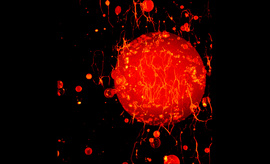A SPRY1 domain cardiac ryanodine receptor variant associated with short-coupled torsade de pointes
AbstractIdiopathic ventricular fibrillation (IVF) causes sudden death in young adult patients without structural or ischemic heart disease. Most IVF cases are sporadic and some patients present with short-coupled torsade de pointes, the genetics of which are poorly understood. A man who had a first syncope at the age of 35 presented with frequent short-coupled premature ventricular beats with bursts of polymorphic ventricular tachycardia and then died suddenly. By exome sequencing, we identified three rare variants: p.I784F in the SPRY1 of the ryanodine receptor 2 (RyR2), p.A96S in connexin 40 (Cx40), reported to affect electrical coupling and cardiac conduction, and a nonsense p.R244X in the cardiac-specific troponin I-interacting kinase (TNNI3K). We assessed intracellular Ca2+ handling in WT and mutant human RYR2 transfected HEK293 cells by fluorescent microscopy and an enhanced store overload-induced Ca2+ release in response to cytosolic Ca2+ was observed in RyR2-I784F cells. In addition, crystal structures and thermal melting temperatures revealed a conformational change in the I784F-SPRY1 domain compared to the WT-domain. The novel RyR2-I784F variant in SPRY1 domain causes a leaky channel under non-stress conditions. The presence of several variants affecting Ca2+ handling and cardiac conduction suggests a possible oligogenic origin for the ectopies originating from Purkinje fibres.


